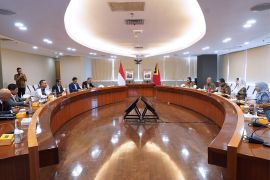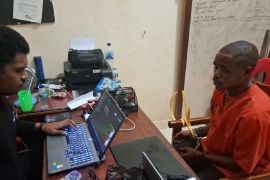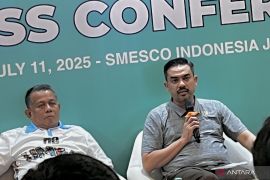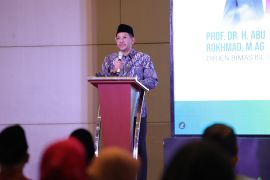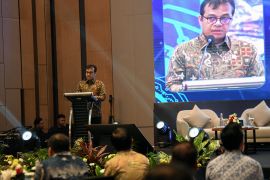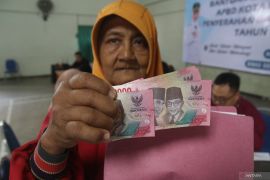These scientific results show that the Pre-Employment Card Program has been successful in carrying out its dual mission during the pandemic, namely improving skills and providing social aidJakarta (ANTARA) - A mismatch between the educational qualifications of graduates and the competencies demanded by the industry is still posing a challenge to developing Indonesia’s human resources.
Currently, the educational backgrounds of around 53.3 percent of workers do not match their jobs, according to Statistics Indonesia (BPS).
This means that most workers have jobs beyond their competency or there is a mismatch between the education that they have with the work activities that they carry out.
This also shows that the course of education and training in Indonesia still needs to be worked on so that it matches the needs of the business and industrial world.
This issue cannot be ignored and needs to be resolved to ensure that workers’ educational backgrounds match the needs of the business and industrial world. The Pre-Employment Card Program seeks to address this mismatch.
The Coordinating Ministry for Economic Affairs is cooperating with the World Bank to create a skills monitoring system, which would align the education and skills program to the demands of the business world.
Related news: Music festivals should coordinate to maintain public enthusiasm
The first step in the monitoring system is formulating a Critical Occupation List (COL) for Indonesia.
According to an official from the Coordinating Ministry for Economic Affairs, Mohammad Rudy Salahuddin, in the international world, COL has been used to formulate targeted education and migration policies to handle gaps in critical skills.
Moreover, the COL has helped policy makers determine training program investments as well as make incentive adjustments for internship programs.
It has also assisted them in selecting which skills job seekers need to develop to raise their value in the labor market.
"With the existence of this list, the mismatch between manpower and industry demand can continue to be reduced in the future," he said.
Based on the 2020 Indonesia’s Occupational Tasks and Skills (IndOTaSk) report results, there are 51 jobs that are in high demand in Indonesia. These are considered to be highly demanded or important for the Indonesian economy as well.
Based on research conducted by the World Bank and the National Development Planning Board (Bappenas), there are five important jobs within these 51 professions: software developer, graphic designer, architect, marketing manager, and financial analyst.
To compete in the working world, especially for filling and mastering high-demand jobs in Indonesia, job seekers need skills that will be an asset when applying for a role.
One of the methods to improve skills is by participating in training with the help of the Pre-Employment Card Program.
Related news: Hospital-based education an effort to plug doctor shortage: Minister
Employment opportunities
Research conducted by Abdul Latif Jameel Poverty Action Lab Southeast Asia (J-PAL SEA) has shown that Pre-Employment Card recipients have over 172 percent probability of utilizing their training certificate when they seek employment.
Pre-Employment Card participants also have an 18 percent higher probability of increasing their chances of getting a new job, it added.
There is also a 30 percent higher probability of Pre-Employment Card recipients increasing their chances of launching their own business.
Meanwhile, research carried out by the Indonesia Precision Research House has concluded that the Pre-Employment Card Program improves competency by 2.2 percent, productivity by 2.7 percent, and competitiveness by 3.8 percent.
Executive director of the Pre-Employment Card Program management, Denni Puspa Purbasari, said that the results of research conducted by J-PAL SEA and Indonesia Precision prove that Pre-Employment Card Program is effective in improving recipients' skills.
Related news: Some 7,306 personnel of TNI, Polri participate in integrated training
"These scientific results show that the Pre-Employment Card Program has been successful in carrying out its dual mission during the pandemic, namely improving skills and providing social aid," she said.
The complete package of training and aid within the Pre-Employment Card is a unique innovation from the Indonesian government in responding to the COVID-19 pandemic.
Testimonies
As soon as she joined the Pre-Employment Card Program, alumnus Jeklin Marvi Pongotak took two types of training, namely graphic design and training to get a satisfying TOEFL score.
She said that thanks to the training provided under the Pre-Employment Card Program, she was able to improve her capacity and her selling points.
This is because the Pre-Employment Card Program provided certificates that helped build clients’ trust in her credibility, she added.
Related news: Ministry to hold vocational school matching again in 2023
"It cannot be denied that people want evidence of whether or not a person's skill is real," she told ANTARA during a Pre-Employment Card event in Bali.
“So, when I have this certificate, it makes it easier to show that I have undergone training and it becomes easier for people to accept it," she said.
She is now actively getting design graphic orders and has also opened a translation service and begun working as a private tutor.
In fact, some of the orders have come from several state offices in her hometown in Melawi, West Kalimantan, despite the fact that she is currently residing in Pontianak, West Kalimantan.
Another Pre-Employment Card alumnus, Erlinda Rambu Enga, also acknowledged that the program has improved her potential to compete in the labor market.
Related news: More specialist doctors proof of healthcare transformation: Minister
After receiving training, she applied to become a BPS partner who conducts surveys on the field.
This was not the first time that she had applied for the job, but compared to her past experience, she was accepted in 2020 when she furnished her certificate from the Pre-Employment Card Program.
Including Pongotak and Enga, 16.42 million people from 514 districts or cities across Indonesia have participated in the Pre-Employment Card Program as of the end of 2022.
The program, which provides 1,224 vocational training programs, is expected to help resolve the challenges of the labor market trend and encourage workers in Indonesia to face various changes with adequate competence.
Related news: Education on clean water preservation should be started early: govt
Related news: Independent Learning Program effort to mitigate learning crisis
Translator: Zubi Mahrofi, Fadhli Ruhman
Editor: Fardah Assegaf
Copyright © ANTARA 2022

